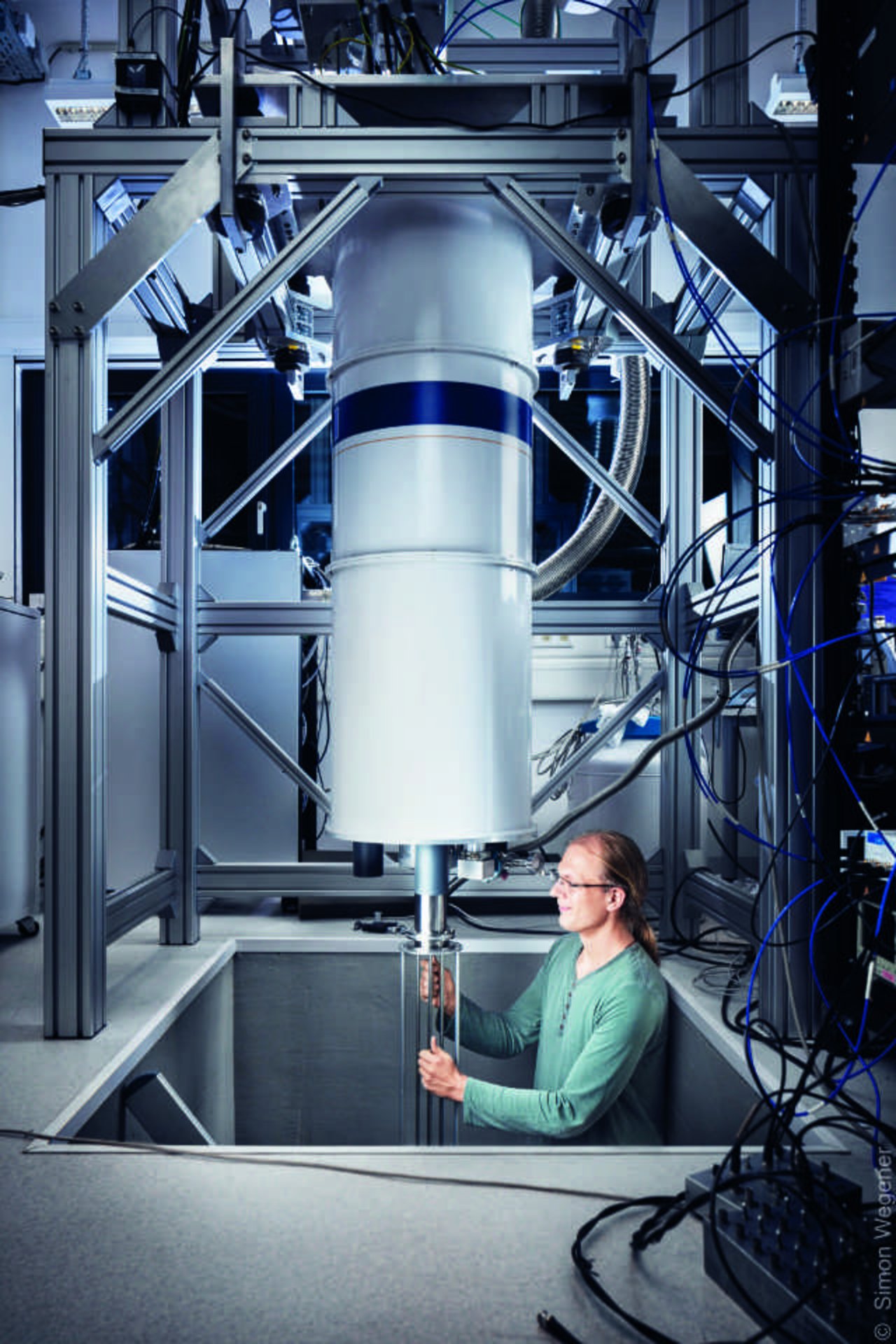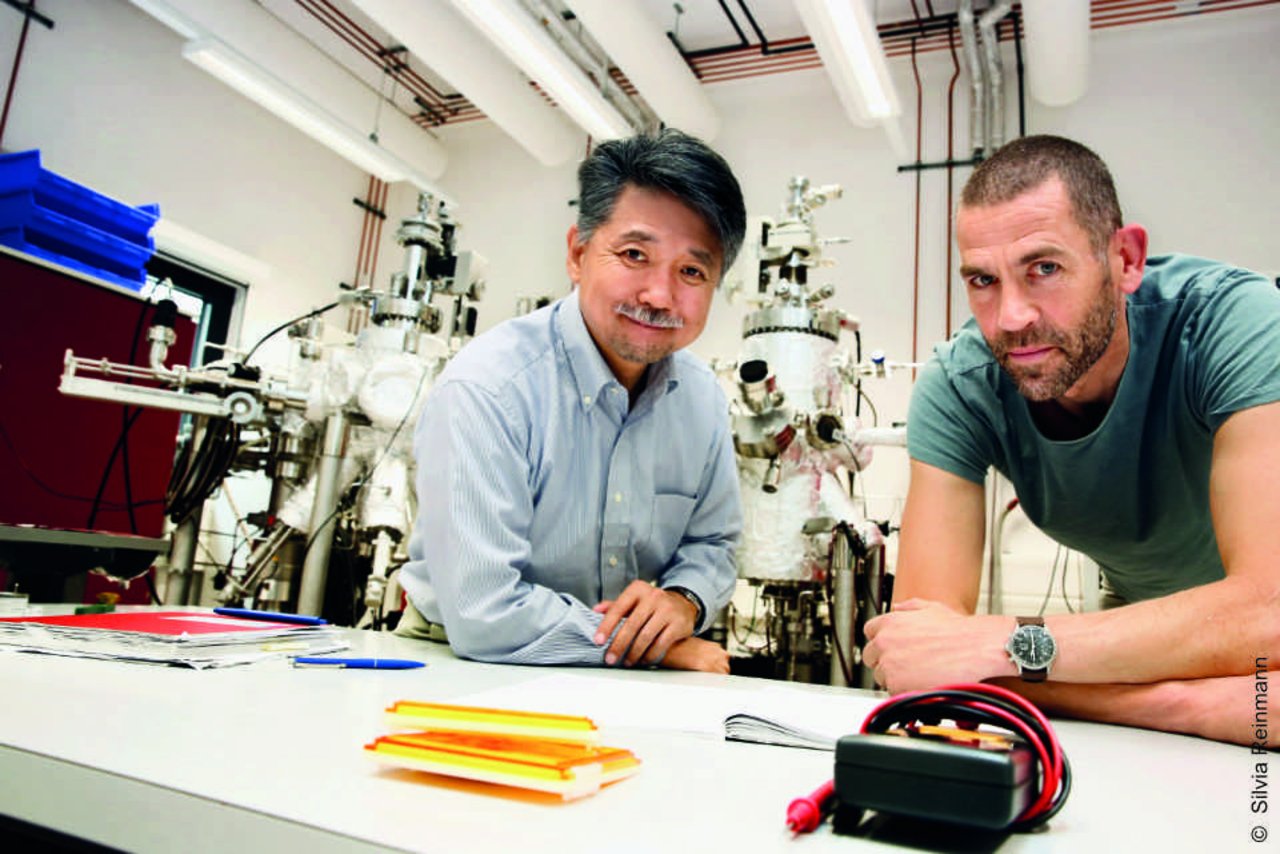Technology beyond imagination
Research at the University of Cologne lays the foundations for a completely new technology: the quantum computer. Step by step, the Cluster of Excellence ML4Q investigates the path to computing in the quantum world. Their goal: To develop stable processors that are millions of times faster than conventional computers.
By Robert Hahn
The quantum computer is considered one of the key technologies of the 21st century. Billions of dollars are being invested worldwide by public authorities and technology companies to build the computing machine of the future based on the principles of quantum mechanics. In the race for the first functioning quantum computers, the success stories of companies are coming in thick and fast. According to management consultancy Boston Consulting Group, a global market of up to 250 billion dollars will have evolved by 2050, and the economic consultancy McKinsey even dubbed quantum technology “the saviour of the planet”. Great expectations – but what is quantum computing and how far has science come so far?
Swiss watchmaker of the quantum world
Quantum computers can perform calculations at previously unknown speeds – millions of times faster than conventional computers. The principle is based on information storage and processing on a level beyond classical physics. The laws of quantum mechanics apply, which are very different from the laws of classical physics. For example, the electron spin, one of its physical properties, is manipulated to store information and generate the so-called qubits – quantum bits, which are the smallest possible unit of information storage and define the measure of quantum information. These new methods would result in larger amounts of data being processed simultaneously.

At the same time, however, the development of this completely new technology also poses new problems that do not affect classical physics: Information at the quantum level can easily become unstable and calculations are falsified. Factors such as temperature or magnetic fields can affect the system from the outside. Chaotic effects at the quantum level can also lead to energy loss: Within tenths of a second, the information-carrying spin can then flip and the information is lost.
The Cluster of Excellence ML4Q (Matter and Light for Quantum Computing) has been working to solve these problems since 2019. The interdisciplinary Cluster of the Universities of Aachen, Bonn and Cologne as well as Forschungszentrum Jülich researches the fundamentals of materials, information transfer and construction technology of quantum computers.
The physicists Professor Dr David Gross and Professor Dr Alexander Altland are both researchers of the Cluster of Excellence at the University of Cologne. Gross is deputy speaker and conducts research in the field of quantum information. His colleague Altland researches the quantum physics of the materials from which quantum computers will be built. They firmly believe that quantum computing is possible and that they can make a significant contribution to its development in the Cluster. As physicists, however, they assess the challenges and opportunities of technology realistically. Alexander Altland responds to the hype surrounding the quantum platforms of global tech giants like Google and Microsoft with scientific reservation: “We don't think much of inflated promises. We have more of a Swiss watchmaker mentality: reliable and accurate. Sometimes that sounds a little less spectacular than what the industry is promising.”
Unlike the industrial players, the researchers have the advantage of being able to work over longer timeframes and to take greater risks. As scientists, the members ML4Q can also publish negative results. “Academic institutions have an important role to play in saying where things do not work – and to be proud to have an impossibility result. Then we know: This is a dead end, so society does not have to invest its energy,” David Gross explained. For example, the scientists of the Cluster found evidence that the qubits of the IBM quantum computer can become unstable.
Small units connect information

Since 2019, the Cluster has established itself as a major technology hub in the Rhineland and attracted international researchers who make ML4Q a unique centre of quantum computing. “We wanted to create our own research structures. I am very proud of what we have created among the universities,” Altland remarked. He sees the Cluster as “halfway there on the road to establishing the Rhineland as quantum research region.” David Gross agrees: “We set ourselves the goal of creating collaborative structures in the region, which we have managed.” Meanwhile, the Cluster has also had an impact on other projects in the Rhineland, such as the construction of a quantum computer in Jülich.
The scientists make use of the entire research spectrum that the Rhineland region now has to offer. Cologne has a focus on solid state research and quantum information, Bonn in quantum optics, Aachen and Jülich are more application-oriented. “Taken together, this creates an interdisciplinary research environment which no individual university or company has on its own. It offers a unique infrastructure,” Gross said. From physical research and the fundamentals of quantum computing to the construction of experimental computers – the Rhineland offers all the research areas needed to realize the new technology.
The individual projects that the researchers have been carrying out in Cologne since 2019 have also produced successes. In terms of devices, there will probably not be a ‘monolithic’ quantum computer so quickly in the future. Instead, there will be small modular units that are connected to each other via a line, a so-called bus, as in the case of a classic computer. This connectivity between qubits requires the kind of interdisciplinary research the Cluster conducts.

The Universities of Bonn (Optics) and Cologne (Matter) are working on the realization of these connectors, which can transmit the unstable information at the quantum level. The scientists have made some progress in the area of the so-called electron shuttle, a method of transmitting the information stored on the electrons. The Cluster also has a lot to contribute to solving the problem of the susceptibility of quantum computers to errors: Significant improvements were achieved by cooperating with researchers from ETH Zurich. Methods of error correction have been known since the 1930s. However, they have never been used on classic computers since they are very robust and reliable. Now the error correction protocols are used on quantum computers. But because the error correction itself is quite complex and can cause further disturbances in the system, it can make the problem worse rather than improve it, David Gross explained: “To put it very modestly: We are not saying that we have found a way to correct the errors of the quantum computer. But we are now heading in the direction where it does not get worse if we correct mistakes.”
A new way to process data
Although research on the quantum computer is progressing step by step, the scientists want to continue to try the big leap and search for a holy grail of quantum computing: the so-called Majorana qubit. This qubit, which up to now exists only in theory, would encode a single bit of information into two so-called quasiparticles, the Majorana fermions. Theoretically, this type of storage of quantum information should not be as unstable as the qubits built so far.
Alexander Altland explained what many scientists in the Cluster dream of: “This qubit is extremely difficult to produce. We don't even have questions of basic material under control. But here in Cologne we have Professor Dr Yoichi Ando, a world expert in the field, as well as some working groups in Jülich. We want to find a way to build the thing.” Gross added: “If we can't build it, we at least want to show definitively that it is impossible. That would be a result with which we would be less satisfied, but satisfied nonetheless.”
Both David Gross and Alexander Altland agree that with quantum computing, a “disruptive” technology appears on the horizon, like the classic computer or laser technology at one time: a game changer that will produce completely new, today unimaginable technologies. But it is not yet clear how this technology will work, what functions it will perform and how humanity will benefit from it. Altland: “We are working on technology that has not yet been seen on this planet. Something will happen that we cannot imagine. And because we can't imagine it, we can't announce it yet.” David Gross added: “It's not just a fast classic computer, it's a completely new way to process data.”
The Cluster of Excellence ‘Matter and Light for Quantum Computing’ (ML4Q) was established in 2019 as part of the Excellence Strategy of the German federal and state governments at the Universities of Cologne, Aachen and Bonn as well as Forschungszentrum Jülich. The aim of ML4Q is to develop new computing and network architectures based on quantum mechanics. ML4Q builds on and expands the complementary expertise of partner institutions in three key research areas (solid state physics, quantum optics, and quantum information science) to develop the best hardware platform for quantum information technology and comprehensive plans for a functioning quantum information network.